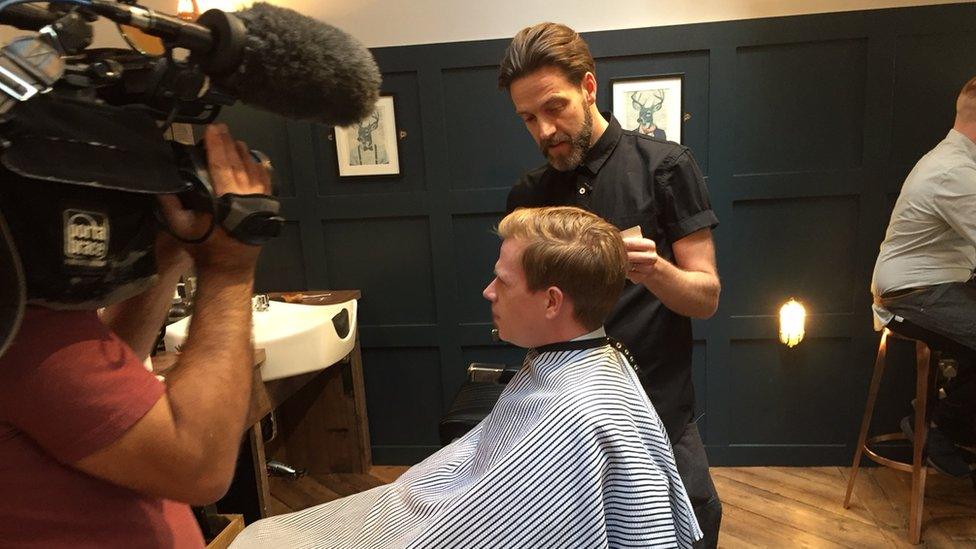The Scottish voters at the heart of a Tory-SNP battle
- Published
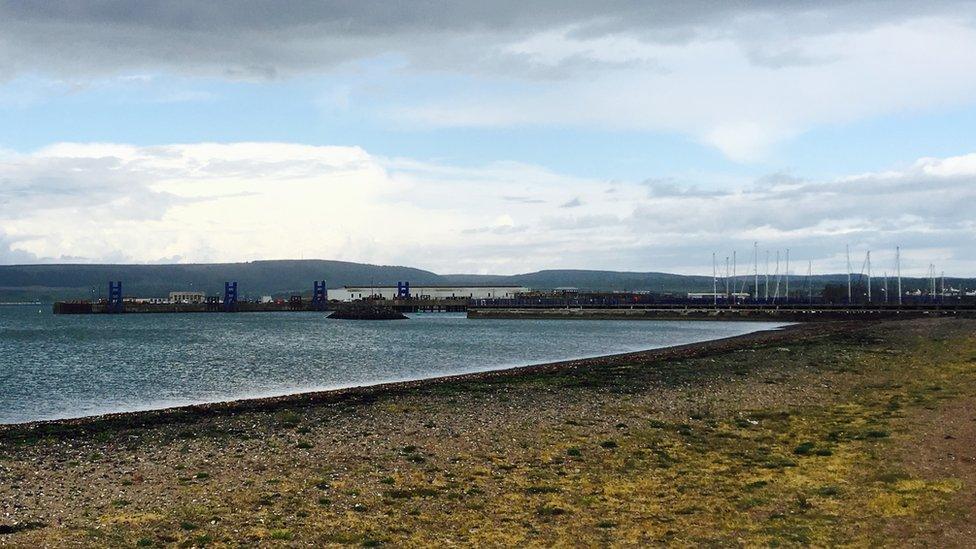
Stranraer's ferry port - once at the heart of the town - has been closed for five years
In the south of Scotland, the towns of Selkirk, Dumfries and Stranraer sit within three constituencies that all voted heavily against Scottish independence. With very narrow margins separating the Conservatives and SNP, they could swing either way.
In the quiet town of Selkirk - with a modest High Street sprinkled with a collection of pubs and restaurants - locals are quick to talk about the settlement's illustrious past as a mill town, and the textile industry that once made it prosperous.
But there's a feeling that the town has suffered in recent decades, and that industrial decline has taken its toll.
Some of the mills are abandoned, although several of the larger ones have been converted into call centres.
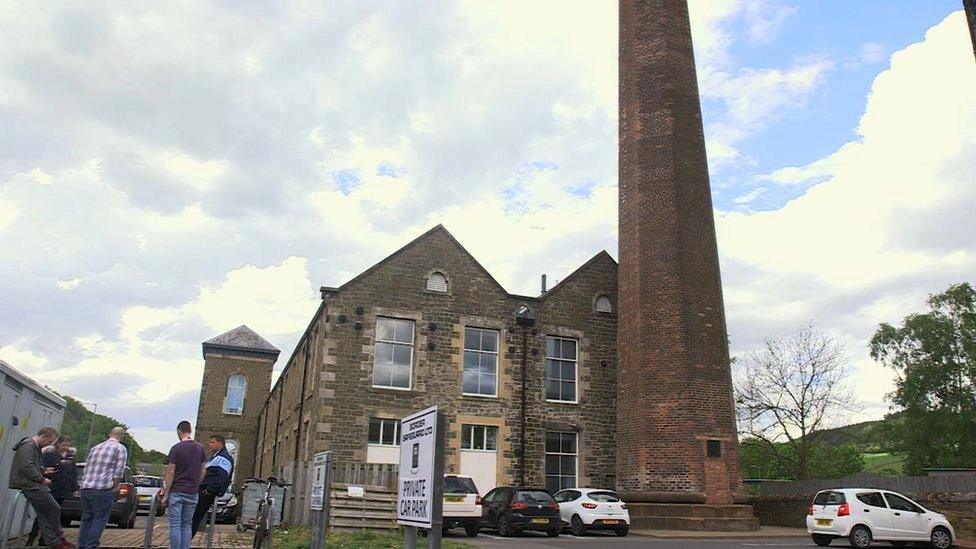
One former mill has been turned into a call centre
Locals are generally grateful for the employment they provide, but Alan Brown - a 22-year-old from nearby Hawick - complains of the insecure and temporary nature of the work, which contrasts sharply with the abundant skilled jobs available to his parents generation.
"There's a few jobs... but they don't keep people longer than three months," he tells the BBC's Victoria Derbyshire programme.
He'll vote SNP, he says, because he feels like the party and its representatives are engaged in the region and understand his specific problems better than their rivals.
Voters in Selkirk have differing views on the election
At a drop-in centre for the unemployed, run by the charity Tomorrow's People, the same anxieties play out.
Young jobseekers describe feelings of alienation from the political process.
Damon Aprile-Turnbull says that during elections "they don't want to hear our words, they don't want to hear what we have to say".
He finds it incomprehensible that, aged 16, he would have been able to vote in the 2014 Scottish independence referendum, but is not eligible to vote now.
Tactical voting
The Scottish referendum, however, still casts a long shadow over Scottish politics.
It's possible to hear impassioned defences of every permutation for Scotland - inside the UK but outside Europe; inside Europe but outside the UK; inside the UK and inside Europe; or outside both.
The three constituencies that run across the south of the country - Berwickshire, Roxburgh and Selkirk; Dumfriesshire, Clydesdale and Tweeddale; and Dumfries and Galloway - will go one of two ways, SNP or Tory.
Two of the three are currently held by the SNP, one by the Conservatives - but that could all change.
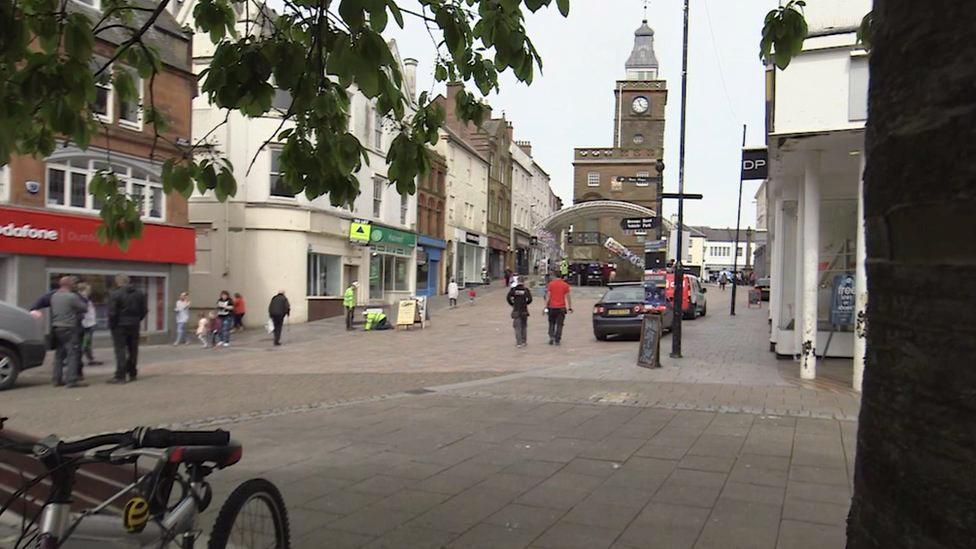
Dumfries High Street is no longer as busy as it once was
In Dumfries, one local, John Dowson, explains how he once owned two shops on the High Street.
Both have now closed, and he complains that the once thriving centre has been depopulated and hollowed out by superstores on the edge of town.
But despite the local issues that played a part in the closures, his passion for both Brexit and Scottish independence are at the forefront of his mind.
Aged 68, and a lifelong Labour voter, he reflects on his options.
Lifelong Labour voter John Dowson may vote Tory
"I have a difficulty," he says calmly, analytically, "I'm tempted to vote Conservative, but I want to vote for independence… that's very, very important.
"But I don't want to see us gain independence as a Scottish country to get freedom from Westminster, only to become subservient to Brussels."
This is not the only electoral dilemma we encounter.
Morag Paterson is taking a sober look at her options and considering a tactical vote.
Morag Paterson is voting tactically for the SNP
She is a firm admirer of Labour leader Jeremy Corbyn, and thinks he's been given a tough time in the mainstream media - not least by the BBC.
But she believes Labour's electoral support in Scotland has collapsed.
"This year, I'll be voting SNP," she says, seeing her main task as doing anything to keep the Conservatives out of power.
For others, however, there is an underlying frustration that the long-running arguments surrounding Brexit and Scottish independence are being repeated interminably.
Many say the question of Scottish independence should be considered settled after the 2014 referendum, and that instead of revisiting the question of the UK's membership of the EU, elected representatives should "get on with it" and deliver Brexit.
Colin Ferguson says debate over Scottish independence and Brexit should end now the public has voted
"We've made all those decisions, what we've got to do now is get on and do it," 28-year-old Colin Ferguson tells us.
He is willing to give the Conservatives the benefit of the doubt, and sees in Theresa May a pragmatism that he admires.
'Huge potential'
Seventy miles west is Stranraer, a town dominated - visually, and politically - by a vast, closed ferry port.
It's a long drive through open countryside, on roads notorious locally for their poor maintenance.
Once the town benefited from a lively trade and busy footfall as a result of the ferries that arrived from Northern Ireland, but five years ago the ferry port was moved a few miles up the road to Cairnryan, a small village easily visible across the loch.
Lorries are loaded with goods and speed down the A77, skipping Stranraer entirely.
Philip Miller used to own and manage a huge Victorian hotel, but it is now closed, and moulding.
But he is far from despairing.
The town has "huge potential", he says, but requires some "imagination".
Seeing the scale of the void that the closed ferry port has left, that seems like an understatement.
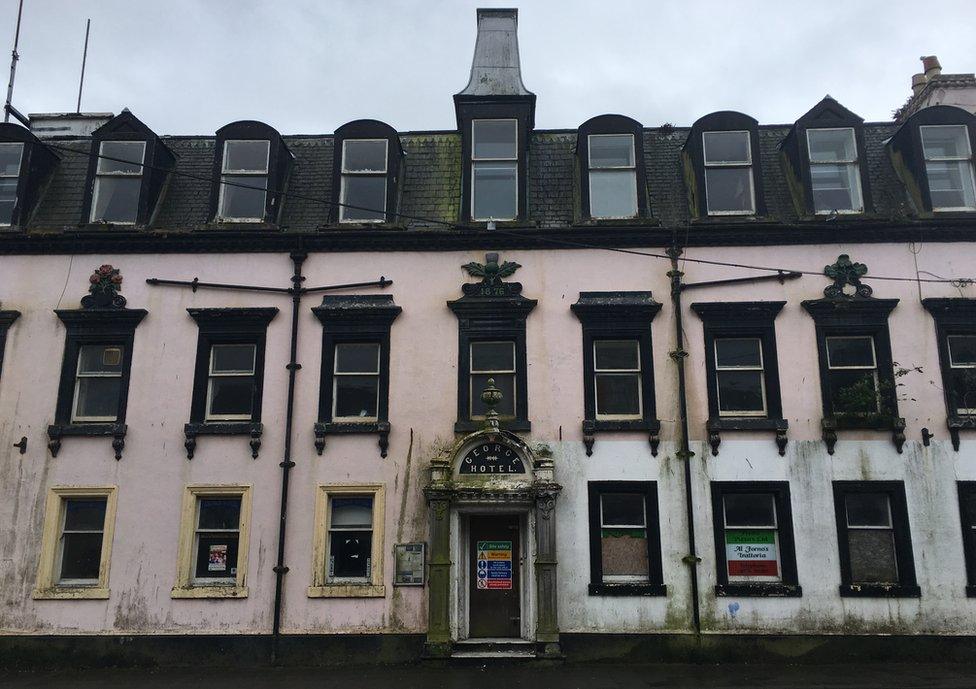
Philip's former hotel has been left to rot
It's not long, however, before the old arguments reassert themselves.
Outside the local flower shop, Byron, William and Raymond - all men in their later years - remonstrate about Brexit and Indyref2.
Byron is a conservative, William votes SNP and Raymond a lifelong Labour supporter - although unsure where he'll cast his vote this time.
They squabble and disagree on points of trade, immigration and what the collapse of the oil price means for the arguments surrounding Scottish independence.
But William is insistent that however much they disagree, their arguments are conducted with respect and tolerance.
It's a chunk of wisdom that everyone in this heated election season might want to reflect on.
Watch the Victoria Derbyshire programme on weekdays between 09:00 and 11:00 on BBC Two and the BBC News channel.
- Published19 May 2017
